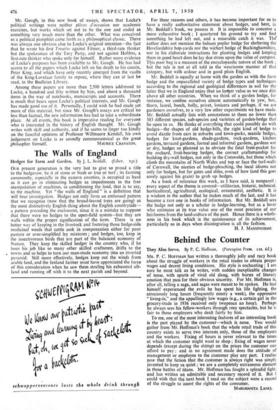Behind the Counter
They Also Serve. By P. C. Hoffman. (Porcupine Press. 12s. 6d.)
MR. P. C. HOFFMAN has written a thoroughly jolly and racy book about the struggle of workers in the retail trades to obtain proper wages and decent living conditions. His style is enchanting ; I am sure he must talk as he writes, with sudden inexplicable changes of tense, with spurts of vivid old slang, with bursts of literary emotion that pass for their obvious sincerity. For Mr. Hoffman is, after all, telling a saga, and sagas were meant to be spoken. He had himself experienced the evils he has spent his life fighting, the atrociously long hours (frequently ninety a week), the oppressive "living-in," and the appallingly low wages (e.g., a certain girl in the grocery-trade in 1936 received only twopence an hour). Perhaps he always sees his fellow-workers through rosy spectacles, but he is fair to those employers whq dealt fairly by him.
To me, one of the most interesting features of an interesting book is the part played by the customer—which is none. You would gather from Mr. Hoffman's book that the whole retail trade of this country exists to serve two interests only, those of the employers and the workers. Fixing of hours is never relevant to the times at which the customer might want to shop ; fixing of wages never depends (except during the skimp) on the prices the customer can afford to pay ; and in no agreement made does the attitude of management or employee to the dustomer play any part. I realise now that the fiction that the customer is always right was simply invented to keep us quiet; we are a completely extraneous element in these battles of titans. Mr. Hoffman has fought a splendid fight, and has written an admirable and necessary record of it. But 1 could wish that the`, next book I read on the subject were a record of the struggle to assert the rights of the consumer.
MAMIE/NITA LASKI.






































 Previous page
Previous page